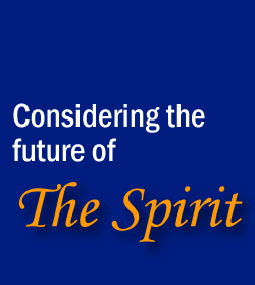Committee defers on yearbook's future
- September 12, 2006
- |
- Will York, Managing Editor
- Section: News
The UTM Publications Committee voted Tuesday afternoon to allow the student-run, student-funded yearbook to produce the two delinquent editions from 2005 and 2006, but stopped short of giving them the go-ahead to produce a 2007 edition of The Spirit, pending their ability to produce the other yet-to-be-completed books.
The committee, composed of various administrators and the student body president, set a Sept. 30 deadline for the completion of the 2005 yearbook, and a Nov. 30 deadline for the completion of the 2006 yearbook editions.
Although the committee considered cutting both delinquent editions of the yearbook and issuing student refunds, they acted to give the yearbook staff an opportunity to prove themselves by setting deadlines for the completion of both the 2005 and 2006 yearbooks.
On Oct. 3, the committee will reconvene to discuss the status of the 2007 yearbook, as well as check on the status of the 2005 yearbook, which should, by that time, already be sent to the yearbook’s printer.
The yearbook is funded by an $8.50 per semester fee paid by every full-time undergraduate student. Students approved the special yearbook fee in a 2002 university-wide referendum. That fee will generate about $78,600 for the 2007 yearbook’s production, despite The Spirit's two-year backup.
The Spirit staff is 38 pages shy of finishing the 2005 edition.
The motion to finish the 2006 yearbook by the end of November passed, but committee member and Vice Chancellor for Finance and Administration Al Hooten voted against the resolution. Hooten said the 2006 edition of The Spirit would not be of acceptable quality if the already-strapped yearbook staff would have to simultaneously produce the 2005 yearbook.
“It won’t be a quality yearbook, as we promised students,” Hooten said. “The probability exists we will never be able to deliver the quality product we promised. I think the communication media students are involved with are different now than they were in the past.”
“We just need to bite the bullet and make [the yearbook] go away,” Hooten said.
Hooten was not the only member of the board questioning the yearbook’s viability. UTM Communications Department Chair Robert Nanney and Communications Professor Rodney Freed said the yearbook’s quality is compromised by the lack of up-to-date photographs.
If students don’t opt to have new pictures taken, then the yearbook staff uses Student ID photos, many of which are taken when students are freshmen.
“What is the point of the yearbook if pictures are not updated,” Freed said.
Committee members also voiced concern over general student apathy. UTM Director of Student Publications Tomi McCutchen Parrish said less than half of eligible students have picked up their copies of the 2004 yearbook, the last to be completed.
But even the 2004 yearbook was not without its complications: Because of the late arrival of the 2004 book, The Spirit has been forced to pay close to $5,000 in postage to send the book to graduates and people who left campus before the book’s printing.
While several members, including committee Chair and Director of Sports Information Joe Lofaro, wanted to cut future editions of the yearbook altogether, the committee finally voted to reconvene to discuss The Spirit's future.
The board did not specify the consequence if yearbook Editor Kim Ferrell and her staff fail to finish the 2005 yearbook by the end of this month.
Student Government Association President James Orr said the committee should not make a hasty decision to eliminate The Spirit before students have had an adequate chance to input their decision. He said before the Oct. 3 meeting, SGA will elicit student opinion via polls and forums.
However, Orr did not approve of a survey, which would be administered to all students taking 10 a.m. classes on Monday, Wednesday and Friday, proposed by Tomi Parrish, The Spirit's adviser. Parrish is also the adviser to The Pacer, UTM’s student newspaper.
But Orr said the yearbook dilemma is more complex than the yearbook staff’s failure to meet deadlines.
“I also think the options we have don’t answer the question why the yearbook hasn’t been completed. We need to know more,” Orr said.
While Orr denied comment on exactly what actions SGA will take before the Oct. 3 Publications Committee meeting, he did say students should have the final say on the future of the yearbook, rather than the committee.
The Publications Committee can vote to eliminate the yearbook altogether at its next meeting with or without SGA approval. If the board votes to cut future editions of The Spirit, the committee would refund students’ $8.50 yearbook fee they paid for the Fall 2006 semester.
Another option would be to cut the print edition of the yearbook and replace it with an online version with a custom printing option.
For more information: Yearbook to be delayed for second consecutive year, The Pacer, Aug. 29
